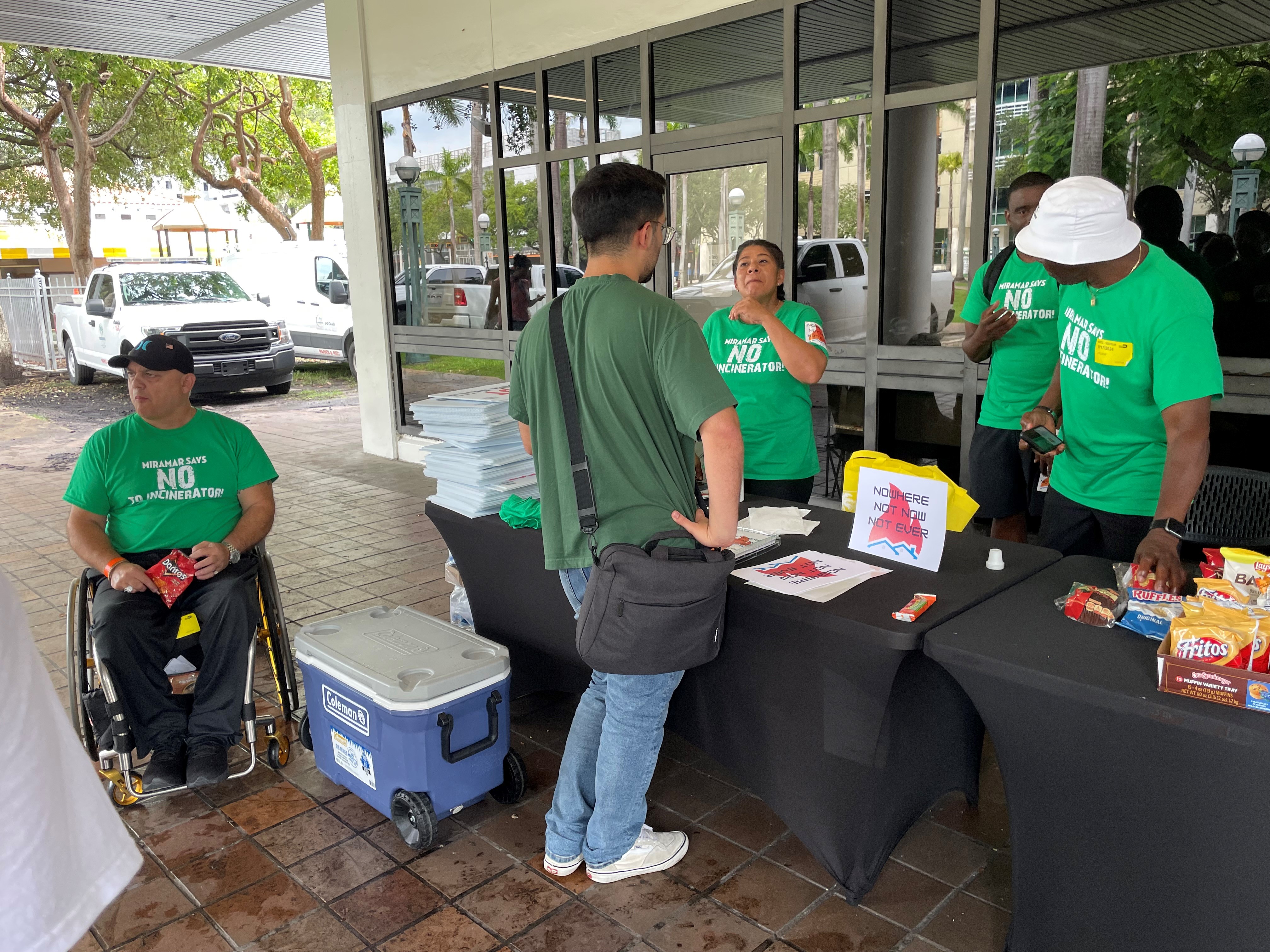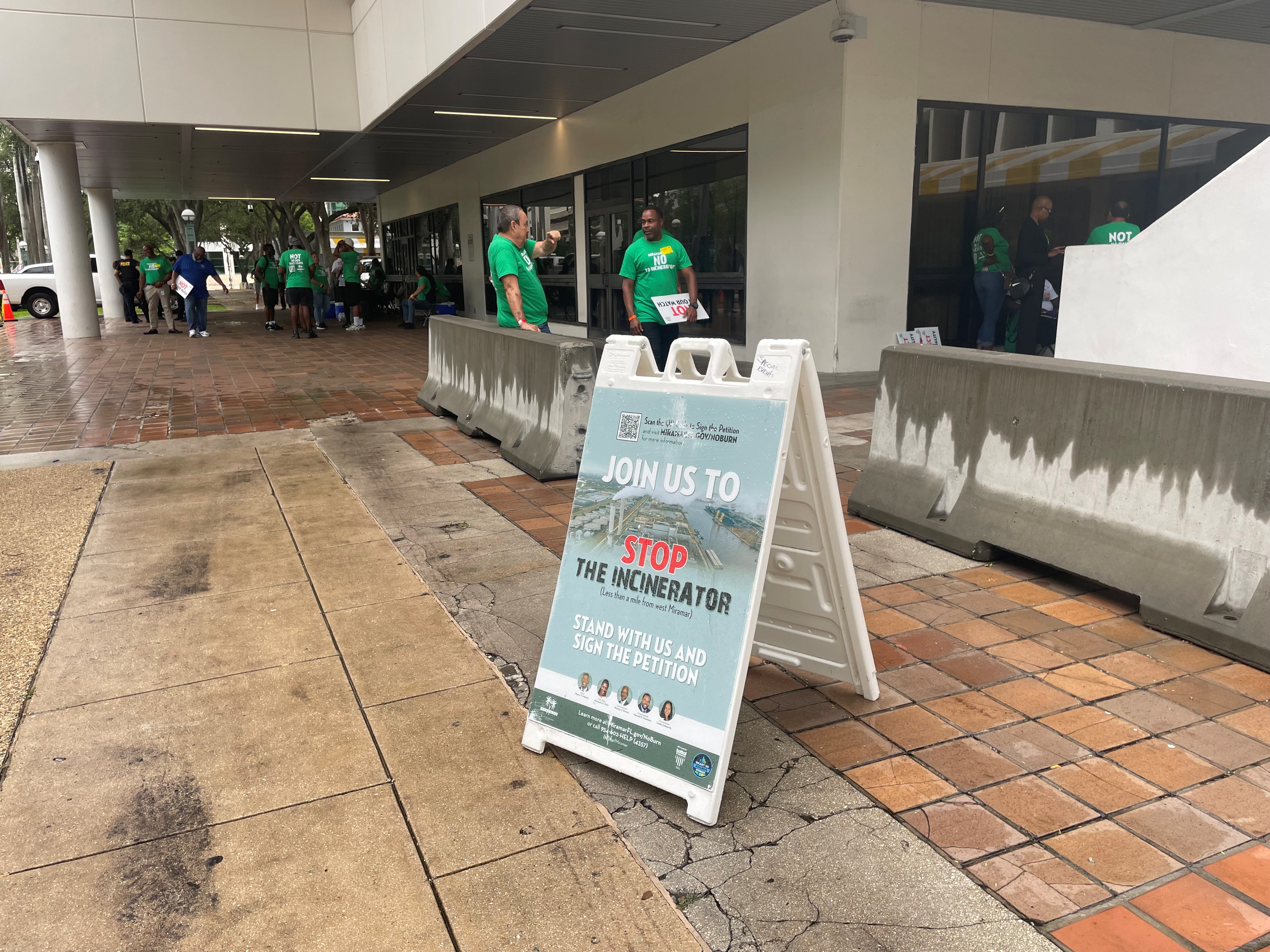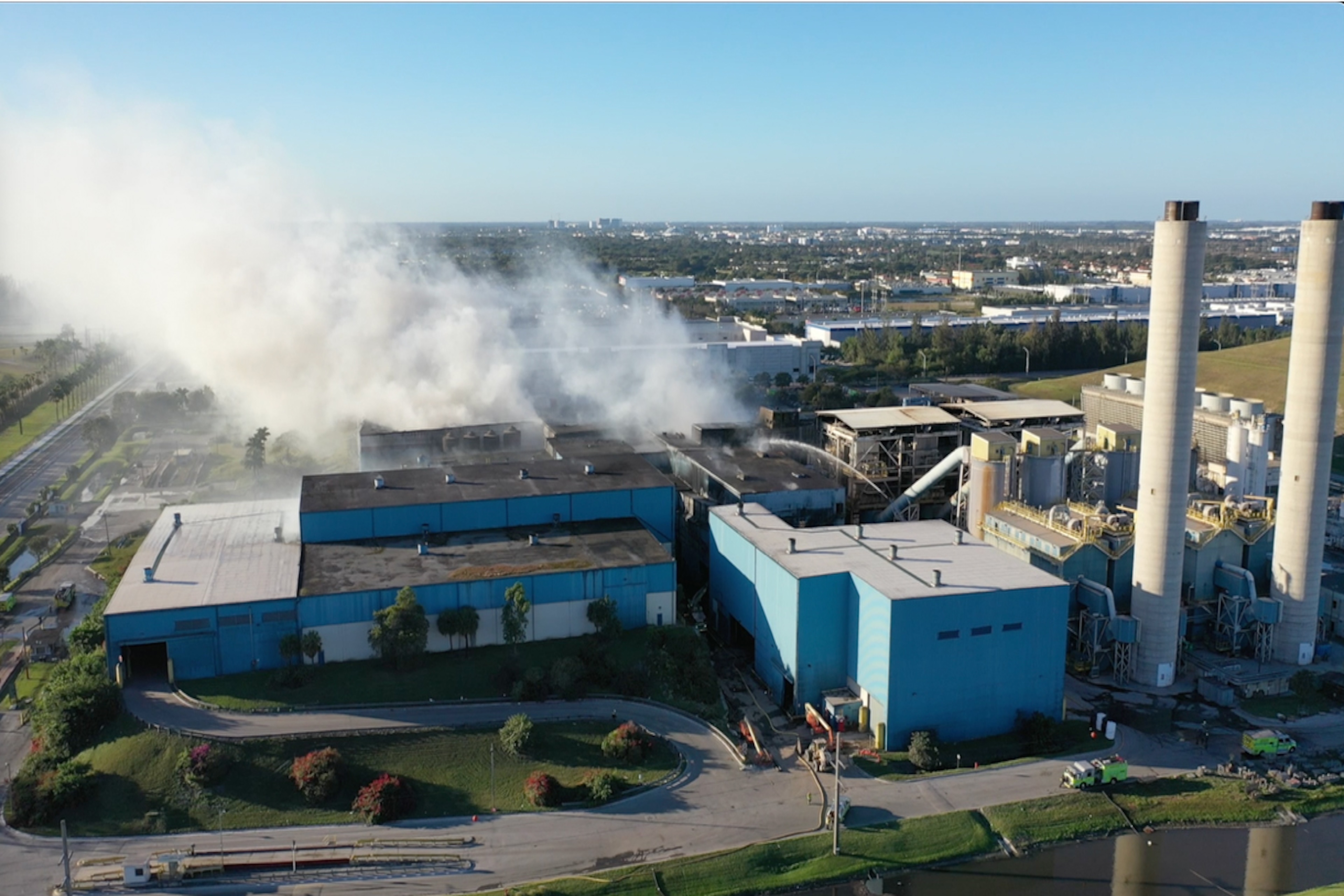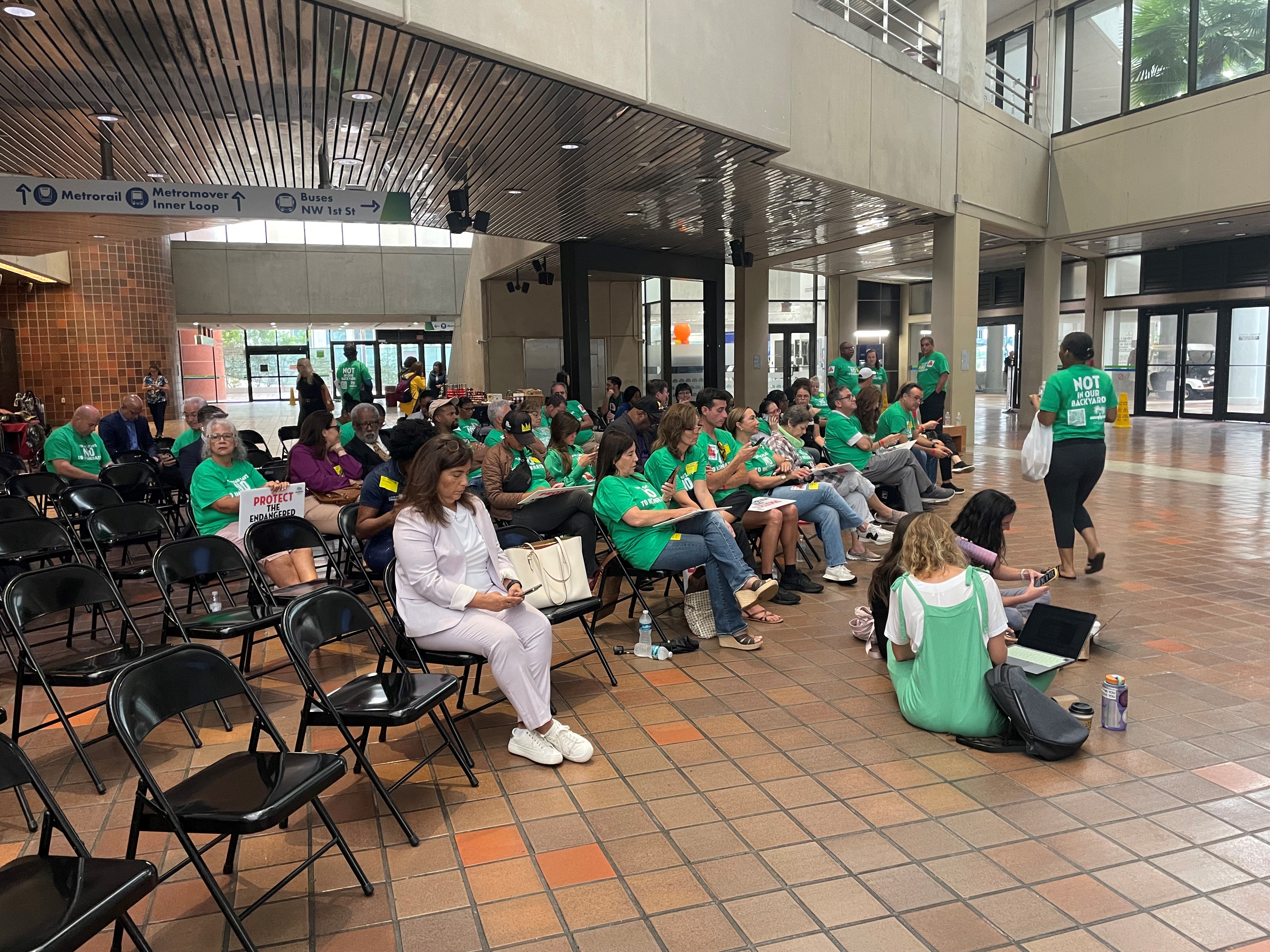MIAMI — When leaders of Florida’s most populous county met in September to choose a website for what may turn into the nation’s largest trash incinerator, so many individuals went to the federal government middle to protest that overflow seating spilled into the constructing’s atrium.
“MIRAMAR SAYS NO TO INCINERATOR! NOT IN OUR BACKYARD,” learn inexperienced T-shirts donned by some attendees who needed to cease the brand new industrial waste facility — able to burning as much as 4,000 tons of rubbish a day — from being constructed close to their houses.
Residents feared the positioning wouldn’t solely sink their property values and threaten the surroundings, but in addition probably hurt individuals’s well being.
Much more, the places appeared to have been chosen in a approach that anxious civil rights and environmental advocacy teams. All 4 websites thought of that day had been in, or close to, among the area’s most various communities, and the state is arguing in federal court docket that race shouldn’t be a consideration in allowing industries that pollute the surroundings.
“Traditionally, communities of coloration have suffered the impacts of poisonous crops close to our cities, affecting our well being and well-being,” Elisha Moultrie, a 30-year Miramar resident and committee chief with the Miami-Dade NAACP, advised the county commissioners.
It’s “environmental injustice and racial injustice,” she mentioned.
Miami-Dade leaders see a special problem: the necessity to successfully handle trash. The county produces almost double the national average per particular person of rubbish, partly resulting from one of many area’s main industries: tourism.
But, all through 2024, Miami-Dade’s elected officers delayed a choice on the place to construct the deliberate $1.5 billion incinerator, because the county mayor and commissioners wrestled with politics. County leaders are scheduled to vote on a brand new website in February.
“There is no such thing as a excellent place,” Miami-Dade Mayor Daniella Levine Cava mentioned in a latest memo to county leaders.
The conundrum unfolding in South Florida is indicative of what some see as a broader development within the nationwide struggle for environmental justice, which requires a clear and wholesome surroundings for all, together with low-wealth and minority communities. Too usually land inhabited by Black and Hispanic individuals is unfairly overburdened with air air pollution and different emissions from trash incinerators, chemical crops, and oil refineries that hurt their well being, mentioned Mike Ewall, director of Energy Justice Network, a nonprofit that advocates for clear vitality and maps municipal strong waste incinerators.
“All of the locations that they might take into account placing one thing nobody needs are in communities of coloration,” he mentioned.
Greater than 60 municipal strong waste incinerators function nationwide, in keeping with information from Power Justice. Though greater than 60% of incinerators are in majority-white communities, these in communities of coloration have extra individuals residing close by, burn extra trash, and emit extra pollution, Ewall mentioned.
And in Florida, six of the 9 current incinerators are in locations the place the chances of individuals of coloration are greater than the statewide common of 46%, in keeping with information from the Environmental Safety Company’s EJScreen, a web based software for measuring environmental and socioeconomic data for particular areas.
Earlier than Miami-Dade County’s outdated trash incinerator burned down in February 2023, the county despatched almost half of its waste to the ability. Now, the county is burying a lot of its trash in a neighborhood landfill or trucking it to a central Florida facility — an unsustainable answer.
Joe Kilsheimer, govt director of the Florida Waste-to-Energy Coalition, a nonprofit that advocates for homeowners and operators of trash incinerators, acknowledges that selecting a location is tough. Firms resolve based mostly on industry-accepted parameters, he mentioned, and native governments should establish methods to handle waste in methods which might be each secure and environment friendly.
“We have now an industrial-scale financial system that produces waste on an industrial scale,” Kilsheimer mentioned, “and we have now to handle it on an industrial scale.”

‘These Folks Don’t Matter’
Florida burns extra trash than some other state, and not less than three counties apart from Miami-Dade are contemplating plans to construct new amenities. Managing the politics of the place to put the incinerator has particularly been a problem for Miami-Dade’s elected officers.
In late November, commissioners in South Florida thought of rebuilding the incinerator the place it had been for almost 40 years — in Doral, a predominantly Hispanic neighborhood that is also residence to Trump Nationwide Doral, a golf resort owned by the president-elect lower than 3 miles from the outdated website. However going through new opposition from the Trump family, the county mayor requested delaying a vote that had been scheduled for Dec. 3.
President Joe Biden created a nationwide council to handle inequities about the place poisonous amenities are constructed and issued govt orders mandating that the Environmental Safety Company and Division of Justice handle these points.
Requested if Trump would stick with it Biden’s govt orders, Karoline Leavitt, the incoming White Home press secretary, mentioned in an e-mail that Trump “superior conservation and environmental stewardship” whereas decreasing carbon emissions in his first time period.
“In his second time period, President Trump will as soon as once more ship clear air and water for American households whereas Making America Rich Once more,” Leavitt mentioned.
Nevertheless, throughout his presidency, Trump proposed drastic reductions to the EPA’s price range and employees, and rolled back rules on clean air and water, together with the reversal of laws on air air pollution and emissions from energy crops, automobiles, and vehicles.
That’s a giant concern for minority neighborhoods, particularly in states resembling Florida, mentioned Dominique Burkhardt, an lawyer with the nonprofit authorized support group Earthjustice, which filed a grievance towards Florida’s Division of Environmental Safety in March 2022.
The grievance, on behalf of Florida Rising, a nonprofit voting rights group, alleges that Florida’s environmental regulator violated the Civil Rights Act of 1964 by failing to translate into Spanish paperwork and public notices associated to the allowing of incinerators in Miami and Tampa, and by refusing to contemplate the impression of the amenities on close by minority communities.
“They’re not in any approach making an allowance for who’s really impacted by air air pollution,” Burkhardt mentioned of the state company. The EPA is now investigating the complaintinvestigating the grievance.
Conservative lawmakers and state regulators have been hostile to legal guidelines and laws that middle on the rights of individuals of coloration, Burkhardt mentioned. Florida Gov. Ron DeSantis, a Republican, has signed into legislation payments limiting race education in public schools and banning public colleges and universities from spending cash on variety, fairness, and inclusion packages.
“They wish to be race-neutral,” Burkhardt mentioned. However that ignores “the very actual historical past in our nation of racism and entrenched systemic discrimination.”

Historic racism like segregation and redlining, mixed with poor entry to well being care and publicity to air pollution, has an enduring impression on well being, mentioned Keisha Ray, a bioethicist with the College of Texas Well being Science Heart at Houston.
Studies have found that neighborhoods with extra low-income and minority residents are inclined to have higher exposure to cancer-causing pollutants. Communities with giant numbers of commercial amenities even have stark racial disparities in well being outcomes.
Incinerators emit pollution resembling carbon monoxide, nitrogen oxides, and tremendous particulate matter, which have been related to coronary heart illness, respiratory issues, and most cancers. Folks residing close to them usually don’t have the political energy to push the industries out, Ray mentioned.
Ignoring the disparate impression sends a transparent message to residents who dwell there, she mentioned.
“What you’re saying is, ‘These individuals don’t matter.’”
Coated in Ash
Florida is one among 23 states which have petitioned the courts to nullify key protections underneath the Civil Rights Act. The protections prohibit racial discrimination by organizations receiving federal funding and forestall polluting industries from overburdening communities of coloration.
These guidelines ask the states “to interact in racial engineering,” argued Florida Lawyer Normal Ashley Moody in an April 2024 letter to the EPA, co-signed by attorneys common for 22 different states. A federal court docket in Louisiana, which sued the EPA in Could 2023, has since stopped the agency from enforcing the rules towards firms doing enterprise in that state.
Miami-Dade’s incinerator, constructed west of the airport in 1982, was receiving almost half the county’s rubbish when it burned down in February 2023. Although the ability had air pollution management gadgets, these measures didn’t at all times defend close by residents from the odor, smoke, and ash that the incinerator emitted, mentioned Cheryl Holder, an inner medication doctor who moved into the neighborhood in 1989.
Holder mentioned each morning her automotive can be coated in ash. Residents persuaded the county, which owned the ability, to put in “scrubbers” that trapped the ash within the smokestack. However the odor persevered, she mentioned, describing it as “a wierd chemical — faint bleach/vinegar blended with rubbish dump odor” — that usually occurred within the late night and early morning.
Holder nonetheless began a household locally, however by 2000 they moved, out of concern that air pollution from the incinerator was affecting their well being.
“My son ended up with bronchial asthma … and no person in my household has bronchial asthma,” mentioned Holder, who in 2018 helped discovered Florida Clinicians for Climate Action, a gaggle centered on the well being harms of local weather change. Although she can not show that incinerator air pollution induced her son’s sickness — the freeways, airport, and landfill close by additionally emit poisonous substances — she stays satisfied it was not less than a contributing issue.

Many South Florida residents are involved concerning the well being results of burning trash, regardless of assurances from Miami-Dade Mayor Cava and the county’s environmental consultants that trendy incinerators are secure.
Cava’s workplace didn’t reply to KFF Well being Information’ inquiries concerning the incinerator. She has mentioned in public conferences and a September memo to county commissioners that the well being and ecological hazard from the brand new incinerator can be minimal. She cited an environmental marketing consultant’s evaluation that the well being danger is “beneath the danger posed by merely strolling down the road and respiratory air that features automotive exhaust.”
However some environmental well being specialists say it’s not solely a facility’s day-to-day operations which might be trigger for concern. Unplanned occasions, resembling the fireplace that destroyed Miami-Dade’s incinerator, could cause environmental catastrophes.
“It may not be a part of their common operations,” mentioned Amy Stuart, a professor of environmental and occupational well being on the College of South Florida’s School of Public Well being. “However it occurs each every now and then. And it hasn’t been that properly regulated.”
No Straightforward Options
Along with Miami-Dade’s deliberate incinerator, three different amenities have been proposed elsewhere within the state, in keeping with Power Justice Community and news reports.
State lawmakers adopted a legislation in 2022 that awards grants for expansions of current trash incinerators and monetary assist for waste administration firms shedding income on the sale of the electrical energy their amenities generate.
A bill filed within the Florida Legislature by Democrats this 12 months would have required an evaluation of a facility’s impression on minority communities earlier than the state supplied monetary incentives. The laws died in committee.
As native governments in Florida and elsewhere flip to incineration to handle waste, the {industry} has argued that burning trash is healthier than burying it in a landfill.
Kilsheimer, whose group represents the incinerator {industry}, mentioned Miami-Dade has no room to construct one other landfill, although the poisonous ash left behind from burning trash should be disposed of in a landfill someplace.
“That is the perfect answer we have now for the circumstances that we have now to function in,” he mentioned.
However College of South Florida’s Stuart mentioned that burning trash isn’t the one choice and that the federal government mustn’t ignore historic and environmental racism. The antidote can’t be to place extra incinerators and different polluting amenities in majority-white neighborhoods, she mentioned.
The main target of public cash as a substitute must be on decreasing waste altogether to remove the necessity for incinerators and landfills, Stuart mentioned, by decreasing communities’ consumption and growing recycling, repurposing, and composting of refuse.









